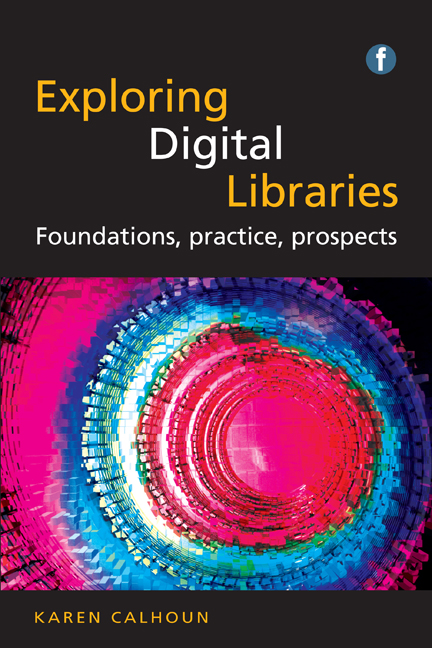Book contents
- Frontmatter
- Dedication
- Contents
- List of figures and tables
- Preface
- Acknowledgements
- Glossary
- 1 Emergence and definitions of digital libraries
- 2 Outcomes of digital libraries’ first decade
- 3 Key themes and challenges in digital libraries
- 4 Digital library collections: repositories
- 5 Hybrid libraries
- 6 Social roles of digital libraries
- 7 Digital libraries and their communities
- 8 The prospects of open access repositories
- 9 Digital libraries and the social web: scholarship
- 10 Digital libraries and the social web: collections and platforms
- References
- Index
1 - Emergence and definitions of digital libraries
Published online by Cambridge University Press: 08 June 2018
- Frontmatter
- Dedication
- Contents
- List of figures and tables
- Preface
- Acknowledgements
- Glossary
- 1 Emergence and definitions of digital libraries
- 2 Outcomes of digital libraries’ first decade
- 3 Key themes and challenges in digital libraries
- 4 Digital library collections: repositories
- 5 Hybrid libraries
- 6 Social roles of digital libraries
- 7 Digital libraries and their communities
- 8 The prospects of open access repositories
- 9 Digital libraries and the social web: scholarship
- 10 Digital libraries and the social web: collections and platforms
- References
- Index
Summary
Overview
This chapter traces the first decade of progress in digital libraries (1991–2001), with emphasis on the foundational innovations, vision, motivations, new technology, funding and early programs that prompted their emergence and rapid development. It next turns to the question of how to define the concept of ‘digital libraries’ in an environment of multiple perspectives and continuous technological and societal change. The chapter's intent is to orient the reader to the field as well as to ground the rest of the book in the context of the aspirations and efforts of many diverse communities and individuals.
the emergence of digital libraries (1991–2001)
This book places the beginning of digital libraries in 1991, the year in which the National Science Foundation (NSF) in the US sponsored a series of workshops on how to make digital libraries a reality, not just a dream. At the same time, digital libraries are an outcome of the revolution in computing, telecommunications and information systems that began almost 40 years ago, around 1965. This section frames the emergence of digital libraries as a recognized field of endeavor in terms of four requirements for viability and growth: a compelling vision, strong motivating factors, technology and funding.
A compelling vision
Many authors (Arms, 2000; Fox, 1993a; Lesk, 2004; Tedd and Large, 2005) trace the vision of digital libraries to a post-World War 2 paper by Vannevar Bush called As We May Think (1945) and a book called Libraries of the Future by J. C. R. Licklider (1965). Licklider's research for the book was sponsored by the US Council on Library Resources (Clapp, 1965, ix). Bush, at that time director of the US Office of Scientific Research and Development, called for a new approach to information organization and discovery based on the visionary concept of a ‘memex’ – a fast, flexible and efficient desktop device enabling associative indexing and instant access to both a vast library and a scientist's personal files.
The ideas and writings of Licklider, a professor of computer science at MIT, vice president of a high-technology company and imminent researcher for the Defense Advanced Research Projects Agency (DARPA), eventually led to ARPANET, a system of networked computers that preceded the internet.
- Type
- Chapter
- Information
- Exploring Digital LibrariesFoundations, Practice, Prospects, pp. 1 - 26Publisher: FacetPrint publication year: 2014

